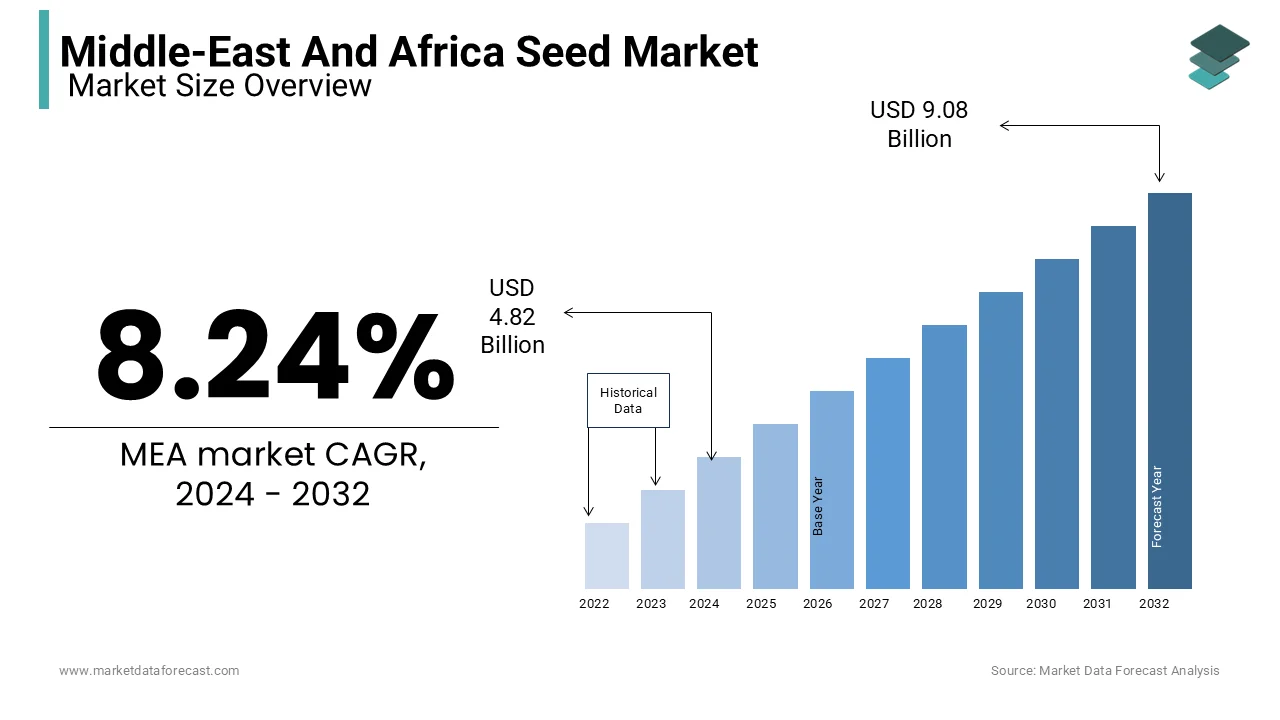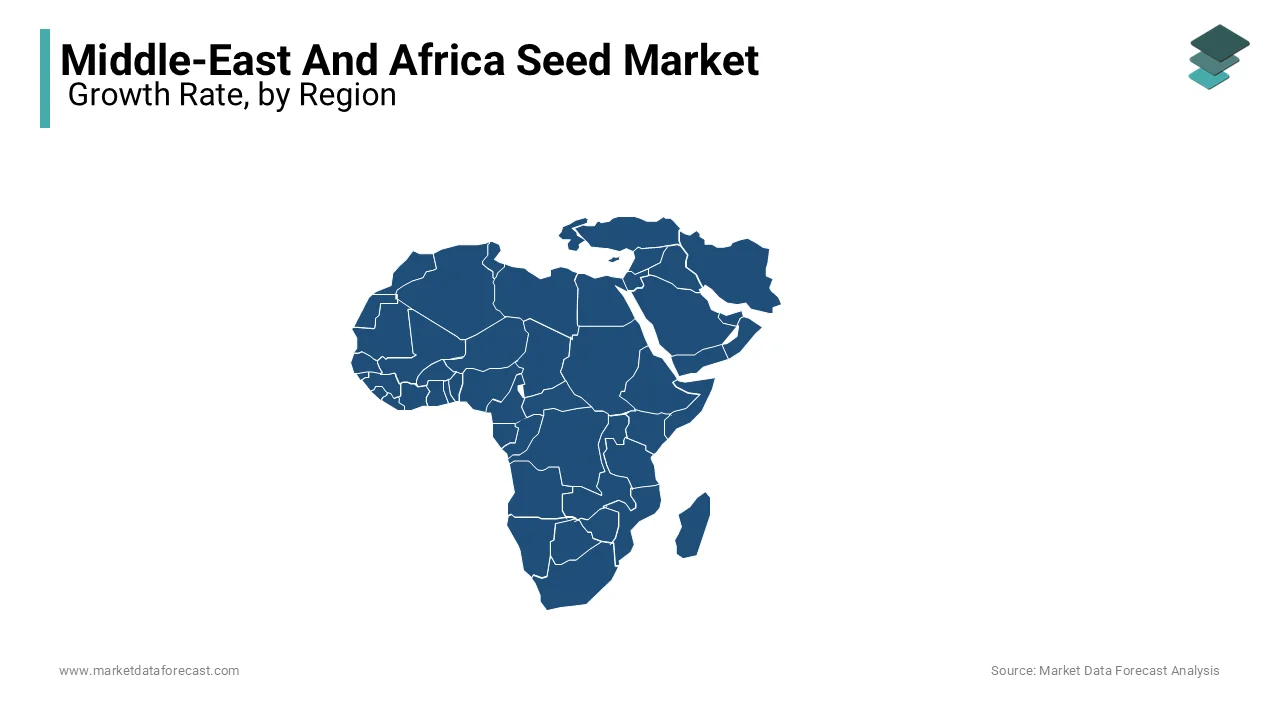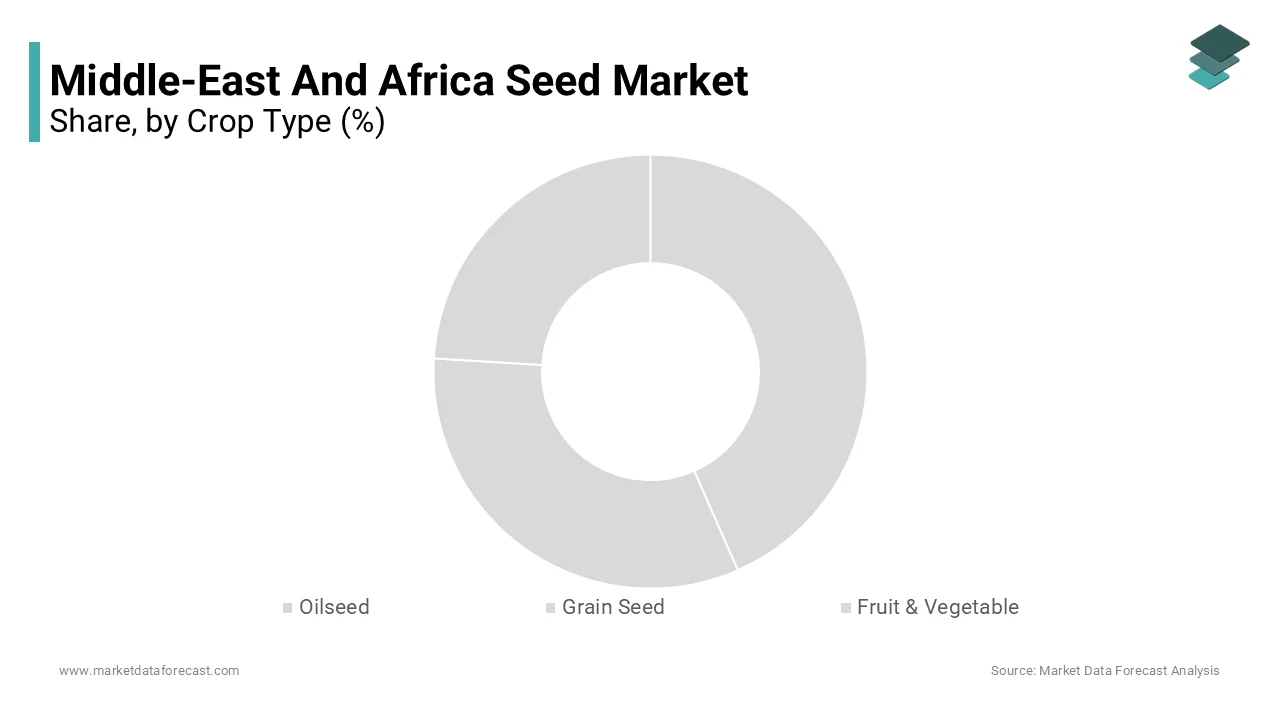Middle-East And Africa Seed Market Research Report – Segmented By Crop Type, Seed Trait, And Country (KSA, UAE, Israel, South Africa, And Ethiopia, Kenya, Egypt, Sudan, Rest of GCC Countries, and Rest of MEA) - Industry Analysis on Size, Share, Trends, And Growth Forecast From 2024 to 2032
Middle East and Africa Seed Market Size (2024 to 2032)
The size of the Middle East and Africa seed market was 4.45 billion in 2023 and is anticipated to reach USD 4.82 billion in 2024 from USD 9.08 billion by 2032, growing at a CAGR of 8.24% during the forecast period 2024 to 2032.

Current Scenario of the Middle East And Africa Seed Market
The production of seeds is an important aspect of improving the overall food supply chain. The rising population in this region is certainly raising the food insecurity concern, which is attributed to eventually leveling up the food supply chain process. Ensuring the moderately high-quality production of crops by focusing on high-quality seeds greatly influences the growth rate of the Middle East and African seed markets. Unfavorable seasons in most of the areas in this region are speculated in choosing high-quality seeds for smooth agriculture practices.
Market Drivers
The growing urbanization and increasing focus on high-quality food practices in the Middle East and Africa substantially elevate the growth rate of the market. Countries in this region are placing prior importance on adopting new farming techniques with advanced techniques. The presence of the topmost countries with the largest explorers of many popular agricultural commodities is sustained to improve the need to choose high-quality seed, which is witnessed in leveraging the growth rate of the market.
In addition, the growing popularity of eating healthy, especially plant-based food products, is solely to enhance the growth rate of the market. Many people are focusing on maintaining proper health by eating healthy products and avoiding animal-based diets, which is gearing up for the growth rate of the market. The growing number of people suffering from various chronic illnesses definitely leverages the demand for plant-based products, increasing the prominence of high-quality seeds.
Market Restraints
However, the high initial cost and maintenance of the farming techniques and systems are slowing the growth rate of the Middle East and Africa seed market. Many farmers face challenges with regard to climatic changes and the limited availability of government support through investments. In many areas, the lack of support from government authorities, especially in agriculture, is forecasted to limit access to farming and, thus, hinder the growth rate of the market to an extent.
In addition, the rising cost of fuel and fertilizers and limited storage space are major impedes to the growth rate of the Middle East and African seed market. Proper agriculture practices also need storage facilities where lack of this will lead to a huge loss of crops that eventually hinder the demand for seeding techniques.
Poor land management facilities in the Middle East and African countries are degrading the growth rate of the market. Decreasing arable land in many countries with eventually growing populations is posing a serious threat to food insecurity. Farmers are skewed toward getting high-quality land for agricultural practices, which also declines the growth rate of the market.
Market Opportunities
Technological advancements in the agriculture sector are one of the most common factors that influence the seed market's growth in this region. These great innovations amplify the production rate of crops with sustainable practices that feature a prominent production rate. Irrespective of climatic changes, the region is moving ahead in the agriculture sector by swiftly adopting new techniques that are only to reduce the concern over food insecurity. The rising population is solely raising the demand for the production of various plant-based food products, which will enhance the growth rate of the market in the coming years. The launch of agricultural sustainability that ensures the quality of seeds that are effective in addressing dry climatic conditions shall promote the growth rate of the Middle East and African seed market.
Market Challenges
Stringent rules and regulations by government authorities to protect the environment from inconvenient agricultural practices shall also negatively impact the growth rate of the Middle East and African seed markets. Most importantly, the presence of the most arid and dry climatic conditions in the Middle East and Africa is posing a major challenging factor for the market's growth rate. Agriculture practices purely depend on the soil quality for the better growth of the plants where the arid or dry climatic conditions characterize water scarcity problems. Unfavorable climatic conditions in the Middle East and African region are likely to hamper the growth rate of the seed market in the coming years as well. Failure of research and development activities with less support and investments by government authorities also slows the growth rate of the market.
This research report on the Middle East and Africa seed market is segmented and sub-segmented into the following categories
Middle East and Africa Seed Market Analysis By Crop Type
- Oilseed
- Soybean
- Sunflower
- Cotton
- Canola
- Grain Seed
- Wheat
- Rice
- Millet Crops
- Fruit & Vegetable
- Tomato
- Melon
- Carrot
- Onion
- Pepper
- Lettuce
- Other Seed
- Alfalfa
- Turf
- Clover & Forage Plants
- Flower Seed
The oilseed segment is leading, with a significant share of the Middle East and Africa's seed market. The presence of various countries with the highest yield of soybeans and others in this region is attributed to leveling up the growth rate of the market. The rising demand for cooking oil with various varieties like sunflower, soybean, and others is associated with a growing number of people using them for cooking. Also, the rising prominence of launching various processed food products using edible oils is likely to enhance the growth rate of the market.
The grain seed segment is attributed to holding the fastest growth rate during the forecast period. Wheat, rice, and millet crops are becoming the staple foods in many countries, with the growing prominence for highly nutritious food escalating the market's growth rate. The government's interference in providing healthy food products to poor people, even in the cities, is additionally surging the demand for high crop yield in respective ways.
Middle East and Africa Seed Market Analysis By Seed Trait
- Herbicide Tolerant
- Insect Resistant
- Other Stacked Traits
The herbicide-tolerant segment is deemed to have a significant growth rate in the market. Increasing popularity over the best selection of seeds with different techniques shall propagate the demand for seed traits in the coming years. The resistant segment is expected to have a prominent growth rate during the forecast period. Rising various plant diseases related to insects is associated with leveraging the growth rate of this segment.
COUNTRY ANALYSIS
- KSA
- UAE
- Israel
- rest of GCC countries
- South Africa
- Ethiopia
- Kenya
- Egypt
- Sudan
- rest of MEA

Saudi Arabia's seed market has gained huge traction over the share from past few years. Government authorities are taking steps to adopt modern techniques in agriculture sectors that will eventually roll out the challenges amid climatic conditions. A high focus on R&D activities to increase the crop yield and potentially overcome food insecurity concerns across the country by improving trading facilities with others substantially improves the growth rate of the market.
Qatar is next to Saudi Arabia and holds a prominent share of the seed market. High per capita income and growing prominence from the public over sustainable food products, irrespective of the desert areas, are boosting the growth rate of the market. These desert environment countries do need seeds that are tolerant to specific climatic conditions. These most advanced technological developments in the agricultural sector are more likely to promote the growth rate of the Qatar seed market.
Specified agricultural practices like smart irrigation and other modern techniques in Israel are expected to propel the growth rate of the market.
RECENT HAPPENINGS IN THE MIDDLE EAST AND AFRICA SEED MARKET
In 2024, Bayer AG and Solynta partnered together to scale up advanced potato farming techniques in Kenya and India. This is the first collaboration of Bayer with Solynta that is centric to develop new robust potato varieties with clean and green disease-free true potato seeds. The collaboration shall find definite ways to commercialize their product portfolio that are suitable according to both countries.
KEY MARKET PLAYERS IN THE MIDDLE EAST AND AFRICA SEED MARKET
Monsanto, DuPont, and Bayer Crop Science are some key players are dominating the Middle East and African seed markets. Existing companies such as Monsanto and Syngenta have been actively involved in the acquisition of regional players to strengthen their market presence.
Frequently Asked Questions
What is the current market size of the seed market in the Middle East and Africa (MEA)?
The Middle East and Africa seed market is valued at USD 4.44 billion in 2023, growing at a CAGR of 8.24% during the forecast period 2023 to 2028.
Which countries in the Middle East are major contributors to the seed market?
Countries such as Saudi Arabia, Iran, and Turkey are major contributors to the seed market in the Middle East, with a focus on enhancing agricultural productivity.
How does the affordability of high-quality seeds compare between South Africa and other African countries?
The affordability of high-quality seeds varies between South Africa and other African countries and is influenced by economic conditions, government policies, and local agricultural practices.
How does the adoption of precision agriculture technologies influence seed planting practices in Israel?
The adoption of precision agriculture technologies in Israel influences seed planting practices, enhancing efficiency, optimizing seed placement, and improving overall crop yields.
who are the key market players involved in the Middle East And Africa seed market?
Monsanto, DuPont, and Bayer Crop Science. Some key players are dominating the Middle East and Africa seed markets.
Related Reports
Access the study in MULTIPLE FORMATS
Purchase options starting from $ 1600
Didn’t find what you’re looking for?
TALK TO OUR ANALYST TEAM
Need something within your budget?
NO WORRIES! WE GOT YOU COVERED!
Call us on: +1 888 702 9696 (U.S Toll Free)
Write to us: [email protected]
